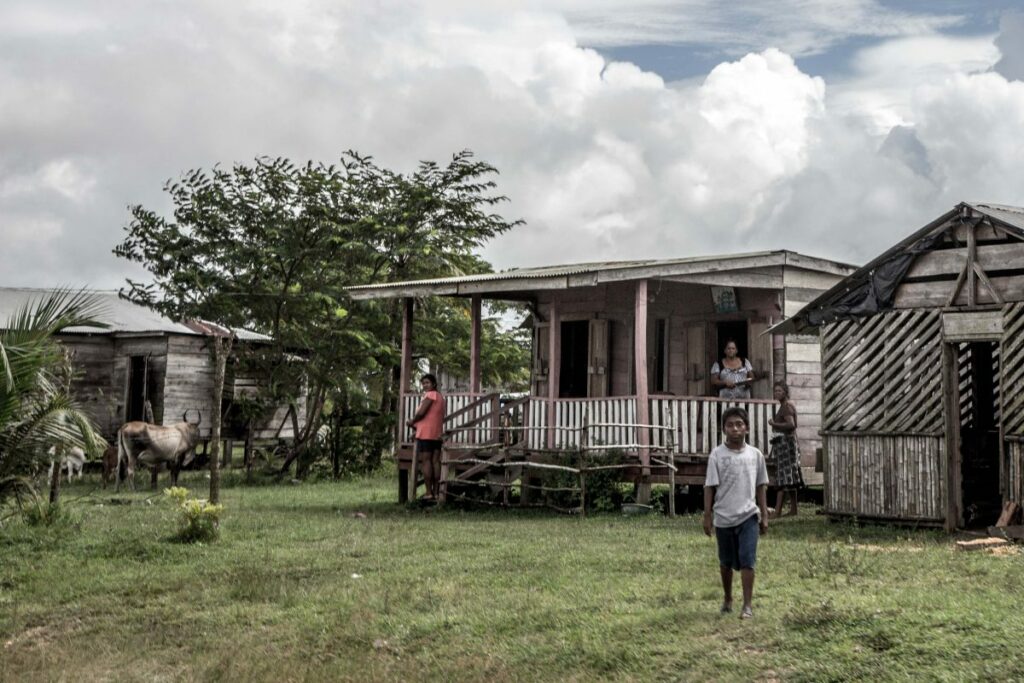An article recently published in Culture, Medicine, and Psychiatry utilizes an ethnographic account of what was locally understood as a “mass demonic possession” by an Afro-Indigenous tribe in Nicaragua, the Miskitos, to highlight how Western European and North American accounts of psychosis and mental illness fail in the Global South and indigenous communities.
The author, the French anthropologist, Maddalena Canna, argues that the “one size fits all” approach to Global Mental Health (GMH) drastically misses the mark on culturally specific phenomena such as the “mass possession” described by the Miskitos. When using the frameworks provided by the Diagnostic Statistical Manual (DSM), Western approaches to mental health and illness do not adequately explain or treat these experiences.
“It has been argued that in everyday practice, clinicians tend to understand idioms of distress as mere ‘local translations’ for well-known psychiatric disorders…Critics have pointed out that, in most clinical practice, cultural diversity is reduced to a matter of substance vs. form. Local conceptions of distress are understood by most clinicians as sheer vernacular formulations of psychiatric categories,” Canna wites.
“Coming back to the possession example, demonic attacks are reduced to local synonyms for better-known Western categories, such as dissociative fugues or seizures…Western categories are implicitly assumed as universals, hard-wired conditions rooted in a static conception of human neurobiology…while local expressions are reduced to a cultural gloss that modifies the form in which they are presented but not their substance…non-Western illnesses and idioms of distress are understood as local labels corresponding to biomedical categories.”
 Global Mental Health has historically misrepresented and misunderstood the experiences of individuals in indigenous communities and communities in the Global South. By over-prescribing and touting American and Western European ideals across the globe, psychiatry and psychology from the Global North have been critiqued for interrupting healing practices from Ghana to India to Mexico to Brazil—as the biomedical model of mental healthcare has expanded around the world.
Global Mental Health has historically misrepresented and misunderstood the experiences of individuals in indigenous communities and communities in the Global South. By over-prescribing and touting American and Western European ideals across the globe, psychiatry and psychology from the Global North have been critiqued for interrupting healing practices from Ghana to India to Mexico to Brazil—as the biomedical model of mental healthcare has expanded around the world.
Maddalena Canna, a French researcher with geographical expertise in Latin America, specifically Nicaragua, explores how the Movement for Global Mental Health fails to understand indigenous experiences around the world. Canna utilizes local understandings of possession and mass possession in the Caribbean Miskitos, who live on the border of Nicaragua and Honduras, to illustrate how the GMH can fail indigenous people.
The “mass possession” or demonic possession, called grisi sikins, that overtakes women in Nicaragua has been previously misidentified, according to Canna, as a kind an expression of sexual repression and conversion disorder:
“The term ‘conversion’ means the transposition, or somatization, of distress (e.g., stress, frustration, rage) into a somatic symptom (e.g., headache, skin rash, fainting). Nowadays, in most global health settings, what is commonly referred to as mass demonic possession is diagnosed as a local version of conversion disorder.”
Conversion disorder has its roots in the earlier conception of “hysteria.” However, Canna argues that the disorder, despite a new name, is merely a re-branding of the same assumptions of hysteria.
“The conflation between conversion disorder and spirit possession is based on disruptive bodily symptoms, such as fainting, shaking, and convulsing, as well as altered consciousness and modified sensitivity, which are found in spirit possession as well as in Euro-American conversion disorders,” Canna explains.
“Because these symptoms do not correspond to any physically measurable cause, they are assumed to be somatizations of conflicted psychic drives, namely repressed sexual desire. Nevertheless, the worldwide application of this one-size-fits-all etiology erases important, distinctive dimensions of mass possession that are not captured–or are even incompatible with–the notion of conversion.”
The incompatibility is most apparent in that Western-created conversion disorders convey an inherent individualism. The mass possession of women in Nicaragua by a demon cast unto them by men dabbling in darkness is inherently collective, as one young victim put it:
“This is like a ball that we pass between us.”
To consider the distressing experience of these women as only individual misses the mark. Instead, Canna claims that grisi sikins is an “intra-gendered dynamic among women” that defies Eurocentric conceptualizations of sexual repression, desire, and disorder—grisi sikins differs radically from the frameworks of repression and desire that exist and have existed in the DSM and other pathologizing frameworks because it dismantles the typical European-American narratives on victimhood, psychosis, and conversion.
Grisi sikins, instead, makes these Afro-indigenous Latina women the object of desire and amplifies their worth. Canonically, the men who conjure the demons do so because they feel rejected by the women, and therefore, they are desired not only by the men but also by the demon.
In addition, the existence of the demon possessing women exposes that sorcery is being practiced, which then hurts the men—as they are exiled once found out.
“Here, desire is a pivotal role, but it is not conceived as an undergirding sexual drive. Here, desire is experienced as a societal drive for power, which demands social treatments and a socially attuned understanding, instead of an individualizing, pathologizing gaze.”
In short, grisi sikins underlines how biomedical understandings of mental health cannot capture the complexity and social-relational nature of mass possession in Nicaragua—Canna has thus found yet another case study of how the GHM, insofar as it relies on the DSM and its Eurocentric frameworks, fails to account for the understandings of other cultures and peoples.
****
Canna, M. (2022). Visceral Visions: Rethinking Embodiment and Desire in Global Mental Health. Culture, Medicine, and Psychiatry, 1-20. (Link)















Article: “Grisi sikins, instead, makes these Afro-indigenous Latina women the object of desire and amplifies their worth. Canonically, the men who conjure the demons do so because they feel rejected by the women, and therefore, they are desired not only by the men but also by the demon.
In addition, the existence of the demon possessing women exposes that sorcery is being practiced, which then hurts the men—as they are exiled once found out.
“Here, desire is a pivotal role, but it is not conceived as an undergirding sexual drive. Here, desire is experienced as a societal drive for power, which demands social treatments and a socially attuned understanding, instead of an individualizing, pathologizing gaze.”
Response: But the roots are still sexist? Even though psychiatry misreads the nature of the sexism?
Ironically, I just watched the film and read William Peter Blatty’s The Exorcist, said to be based on a real life case of exorcism in the states. However, when the author crafted his novel, published in 1971, he changed the main character from male to female.
The popular title sold well especially as a film, but the sexism inherent in a fictional account of the most popular deity in Christianity ostensibly sexually violating a female with the main object of faith, a crucifix, thanks to demonic possession, didn’t register with fans as sexist or stop sales in the US. The movie was the most successful horror film for decades and won the Academy award for best picture. Americans liked watching a 12 year old girl possessed and violated.
When I used a metaphor based on The Exorcism to describe my own criminal violation in the mental ward of a Catholic hospital, people were outraged. Not at the crimes committed against me, but at my audacious though fair description.
https://www.madinamerica.com/2021/10/people-dont-recover-criminal-psychiatry/
Report comment
“Western European and North American accounts of psychosis and mental illness fail in the Global South and indigenous communities.” And they’ve failed in North America and Western Europe as well. For God’s sake, the DSM was debunked as “invalid” in 2013, by the head of the NIMH. For goodness sakes, how long will it take for the “mental health” system to garner insight into the fact that their DSM “bible” is “bullshit”?
Report comment
I agree 100 percent! And I don’t even consider them Western European and North American accounts. I consider them medicalized accounts of psychosis and mental illness, which work primarily for those providing “services” and selling drugs, and which work for almost no one of any culture otherwise.
Report comment
Not voices
Report comment
No way!
Report comment
I am beginning to question if alleged mental illnesses may not really be demonic possessions of the individua Therefore, the psychiatrist is actually making the problem worse through drug, talk therapy, and other treatments when the person really needs the intervention of a member of the religious clergy. Before the enlightenment and science took over the world, that was the common belief. The question that few want to consider is that that could still be the truth even now in the 21st century. Thus, that would make much of what we thought as a medical problem to really be a spiritual/religious problem and explains a lot as to why mental illness theories and practices ultimately fail. It may also explain why there is so much what we would otherwise consider societal ills, such as violent crimes, etc. I don’t know. This is just an idea to really consider and question, especially after reading this article. And if that were the actual truth, could it be that the enlightenment which has influenced so much even now into the twentieth century may not be so enlightened after all with the truth being that we do need God and not psychiatry as the answer to our problems. Thank you.
Report comment
Removed for moderation.
Report comment
“I am beginning to question if alleged mental illnesses may not really be demonic possessions of the individua”
I think the evidence is clear that there is no God in any one traditional sense. And certainly no demonic possession. We need to lose all the fairy tales, witches and goblins, as well as the nonsense of psychiatry. The belief in God, demons and psychiatry are connected in the childish part of out collective thinking. There is spirituality, there is sexism, and there is human suffering. There is human evil. There is great power in the existence of the universe, but explaining suffering as demonic possession? Backward motion, in my view. Trying to DSM “God”? Same misguided impulse as the DSM.
Report comment
I am aware of a case from near the Mexican border, where all angles of “western” psychiatry had been tried on a so-called “schizophrenic” in a hospital there. They brought a shaman from Mexico over the border to do a spiritual exorcism. The person got better.
There are also shamans involved in the hospital system in Brazil, from what I understand. I don’t have any idea if “spirit possession” is a real thing or not, but spiritual cleansing of various sorts has been arguably more effective than anything psychiatry has to offer. And the side effects appear to be WAY less!
Report comment
The ultimate placebo, no different that people who buy into pill placebos.
Report comment
Except that “removing evil spirits” can’t actually harm you! Much preferable to the “active placebo effects” of SSRI antidepressants, for example. If someone can get better by an exorcism, so much the better for them, because they can dispense with the psychiatric system, which can really do some damage!
Report comment
I must have missed that evidence that there is no “God in the traditional sense.” It’s probably a good idea that I did, since Jesus Christ, His Son, saved my life from the evils of psychiatric drugs, nine years ago this Spring when I almost died. Without God, without Jesus, I would be dead now from those drugs, etc. Each day, I thank Him for my very life. Thank you, Jesus. Thank you.
Report comment
Thank-you, “rebel”! Personally, I believe in God. Even though I KNOW my belief in God does NOT prove that God exists. My FAITH in God, practiced daily as a Buddhist, sustains my recovery from the near-fatal pseudoscience of psychiatry. I feel a real kinship to those indigenous women! Within their culture, their experience makes sense to me! It’s not about repressed individual
sexuality, it’s about social power and control. I’d love to see some astrologer go to Nicarauga and explain things there in terms of astrology! LOL!
Report comment
In my opinion, for a non-shaman, non-medium persons to interpret what is at work here is like someone who cannot see colors trying to be an expert on impressionists paintings. Simplistic and false. I would not dare to interpret anything without a personal living experience of the trance.
Shamans know the lower astral, where they establish connections with nature entities and the deceased. They may also connect to the higher planes where advanced spirits and light beings procure guidance and healing. Alternatively, you can explore this with hypnosis or as a medium.
Report comment
Jules, Im sorry it took me 5 years to find those excellent memes. How can I help you give them wider exposure? Will you see if MiA will give your work & story a feature? Also, please continue to comment here at MiA. We NEED your perspective!
Report comment
Dear Bradford,
Thank you.
The memes you mention are old.
http://depsychiatriser.blogspot.com/2017/08/les-memes-internet-de-jules-malleus.html
I am no great artist, and I have changed, too. I am more of a spiritual person now. 🙂
Report comment
“rebel”:
In my DECADES of personal lived experience in recovery in A.A.- Alcoholics Anonymous, decades of recovery from psych drugs, I have met many Christians who sharesimilar stories as yours, and who witness for Jesus Christ. I do not share your full beliefs, but I deeply respect them, and see their value. Please continue to share here at MiA. The book “Jesus and Buddha as Brothers”, by Vietnamese-French Buddhist monk Thich Nhat Hahn, will explain my perspective as a Buddhist, and why I treasure YOUR experience of salvation by Jesus. You and I are as loving brothers, “rebel”…. Our common “enemy” is the pseudoscience of psychiatry….
Report comment
Thank you for your kind comments. I think that I had a copy of the book you mention in your post, but unfortunately lost it in a recent move. I have read a few books on Buddhism, but I confess I still don’t entirely understand it, still, I respect it. The book you mention is quite a beautiful book, if I remember correctly with some very beautiful pictures and both Biblical Scripture and Buddhist Scripture with an emphasis on commonality. However, I really like what you said at the end of your post… we are as “loving brothers” (although, in my case, I’m more of a “sister”) and yes “our common “enemy” is the pseudoscience of psychiatry. . .” Thank you.
Report comment
OK, full confession, “rebel”, I’m kinda traditional & old fashioned. My “loving brothers” comment was intended as gender-neutral. LOL! What I’ve found about reading intro-level Buddhism, like the Dalai Lama’s many books about Buddhism, is that the more I read & understand it, the more Christianity makes sense to me! I still think Zen Buddhism, with it’s Koans, is a mind-warped headgame, though! What I learned in both A.A. recovery from working the 12 Steps, and Buddhism, is to seek to understand & ACCEPT reality AS IT IS, and not as I want it to be, or how others tell me it should be. And that with “independent happiness”, I am happy simply because I CHOOSE to be happy. Psychiatry, with it’s neuro-toxins & LIES, wanted me to believe that I had a “mental illness”, a “broken brain”, and a “chemical imbalance”, and would need their drugs for “the rest of my life”. Instead, I see now that I am LIVING PROOF, – a witness, – of the lies of the pseudoscience of psychiatry. Gee, Doc, what happened to my “mental illness”?…. Today, I’m a happy man, with a good life. I am very grateful, and glad to be alive. The time I spend here with my FRIENDS on MiA is very valuable to me!
Any human person is always healthiest in regular “communion” with healthy others others in healthy groups. That’s also the only real ideal for helping those in distress. When Western Allopathic Psychiatry divides the individual out from the group, and stigmatizes them with an individualized “mental illness” label, worse health is the inevitable outcome. The drugs only create more illness long-term, not less…. That’s why media & psychiatry both, are so addicted to using the words “suffer”, & “struggle” any time they discuss “mental illness”. Psychiatry is so PSYCHOTIC, that now they use the neo-logism “mental health condition”, to mean the same thing as “mental illness”!. When you think about it carefully, they are saying that a condition of mental health, and a mental illness are the SAME THING! Yes, I wrote this carefully, and that’s exactly what they mean! Psychiatry has lead itself by the nose so long, that they have no credibility left anymore! Psychiatry is ridiculous nonsense at best, and literal drug-slavery and death, at worst. No wonder I was such an unhappy mental patient! LOL!
….BTW, yes, I studied this question, to confirm something I had read: When seen clearly and logically and rationally and factually, the current practice of psychiatry DOES MEET the legal definition of GENOCIDE. Yes, that’s what I’m saying. Literally.
PSYCHIATRY IS A FORM OF GENOCIDE.
Since when is genocide a branch of medicine?….
At least since the Nazi Death Camps & Soviet Gulags.
And I know and see many genocide-by-psychiatry victims everyday here in my small hometown. It’s a sad thing….
I’d like to think that psychiatry stays away from these indigenous people in Nicaragua, but….
Thank-you, “rebel-woman”! Did I get that correct this time? If you smiled I did! LOL!….
Report comment